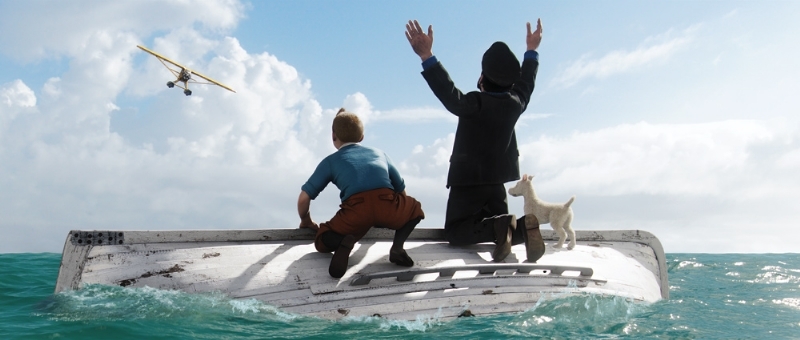| Worth seeing: | for current fans of the intrepid boy reporter, more than enthusiasts who've long since grown up |

| Director: | Steven Spielberg |
| Featuring: | Jamie Bell, Andy Serkis, Cary Elwes, Daniel Craig, Daniel Mays, Enn Reitel, Gad Elmaleh, Joe Starr, Mackenzie Crook, Nick Frost, Simon Pegg, Toby Jones, Tony Curran |
| Length: | 107 minutes |
| Certificate: | PG |
| Country: | New Zealand, US |
| Released: | 26th October 2011 |
WHAT’S IT ABOUT?
Intrepid young reporter Tintin (Jamie Bell) is drawn to a model ship he finds at a local market. Moments after he’s bought it, two separate people pounce, to try to take it off his hands.
Tintin liked the look of the ship, but clearly there’s more to it than meets the eye and the journalist in him is determined to find out why everyone else is so keen to get their hands on it.
It turns out that inside the model of the Unicorn is one of three clues to the location of some treasure that the evil Sakharine (Daniel Craig) is keen to trace.
Setting off, with his faithful dog Snowy, Tintin teams up with the alcoholic Captain Haddock (Andy Serkis) and with the help of two detectives, Thompson and Thomson (Simon Pegg and Nick Frost), they travel the world to find the clues to try to beat Sakharine to the treasure.
WHAT’S IT LIKE?
Steven Spielberg has taken three decades to achieve his dream of bringing Hergé’s boy reporter to the big screen – among the delays was waiting for the right technology to get the vision he wanted. It’s understandable that he was concerned that making a live action version would limit him to cast who resemble the original drawn characters – but given that they are indeed drawn characters, it begs the question of why he didn’t just stick to the original design.
The opening credits are more true to the comics than the film itself – and a portrait, drawn by a street artist in the opening scene, will illicit a nod of recognition from fans that will rapidly fade as the adventure progresses.
Given that motion-capture is all done in a computer anyway, it’s not surprising that Spielberg and his producer, the motion-capture kind Peter Jackson, offer us a 3D version – but as is so often the case, it doesn’t particularly add to the narrative or mood.
Drawing material from three of Hergé’s books, a script from British writers Stephen Moffat (Doctor Who), Edgar Wright (Shaun of the Dead) and Joe Cornish (Attack the Block) delivers the kind of thrilling action sequences that would’ve made a young Indiana Jones feel at home – it was, in fact, around the time of Raiders of the Lost Ark that Hergé himself first approached Spielberg to suggest he take on Tintin.
But this film is little more than a series of beautifully animated, astounding action scenes, strung together by highly imaginative, visually enthralling transitions – which sounds impressive, but it’s less than the sum of its parts.
Without the love interest or historical context of the Indiana Jones films, there is little to affect either the characters or us viewers on an emotional level, which makes it feel a little flat – little more than a boy’s own adventure.
It falls neatly into the category of that kind of film that adults will enjoy more with their children than without – largely because the narrative and characterisation is linear and simplistic in a way that would appeal more to younger viewers and while it’s the adults who are, perhaps, more likely to have a nostalgic attachment to Tintin, most would have felt more comfortable with visuals that bore more resemblance to Hergé’s own Tintin.
The largely British voice talent do their best with the material – but given that most of the humour comes from Thompson and Thomson falling down stairs, Pegg and Frost don’t get a chance to use their comic talents – and Jamie Bell without his northern accent seems oddly blank.
As well as having a terrific grasp of roller-coasting excitement – which is displayed here in bucket-loads, Spielberg’s great skill is getting heart-warming performances from his actors – and motion-capture isn’t yet at the point where the characters exude true emotions.
Tintin’s first – and certainly not last – big screen adventure will find a broad fan base, but it won’t overlap too much with those who loved the comics and it’ll be skewed towards the younger end of the audience demographic.
I’m not sure that it was worth waiting three decades – and for 3D motion-capture technology – to see Tintin in the cinema. It’s not a great film – but it’s unquestionably a great kids film.
